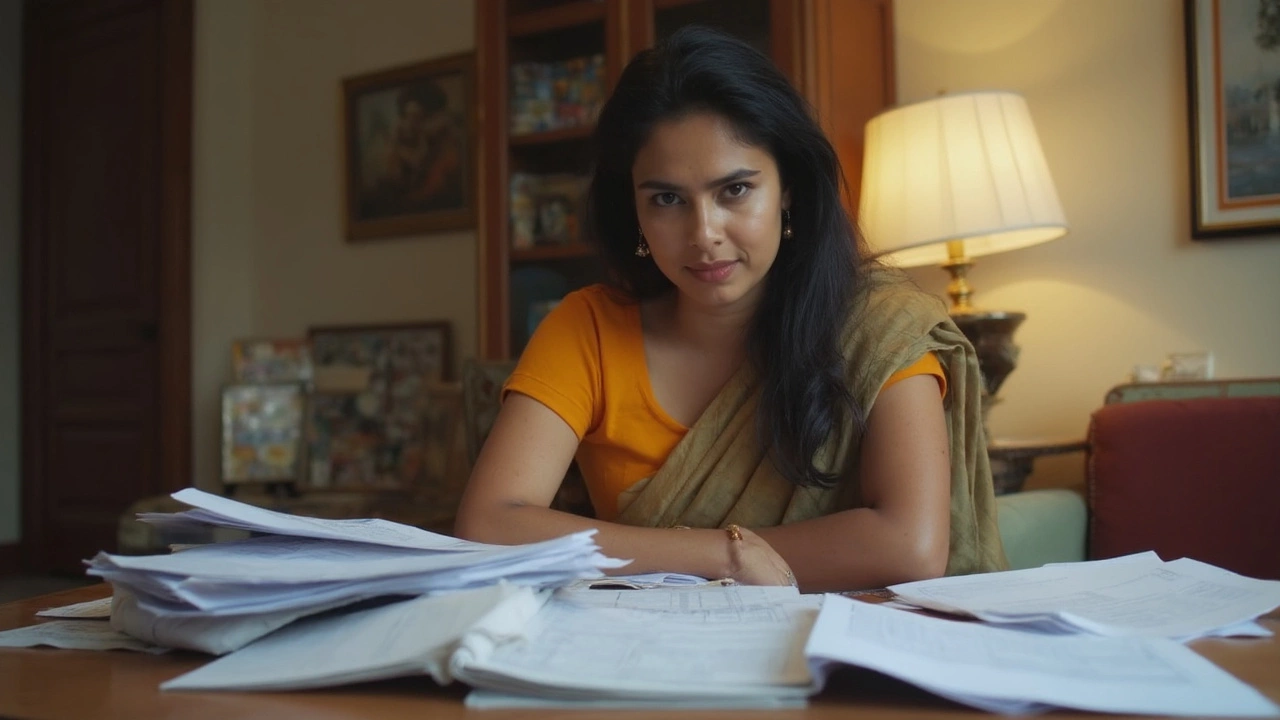If your husband passes away in Virginia, the last thing you want is a surprise knock from creditors. The rules are surprisingly clear, but most people get them wrong. In Virginia, you usually aren’t personally responsible for debts your husband racked up by himself—credit cards, old loans, medical bills, that sort of thing. Those debts go to his estate, not directly to you.
But there’s a catch. If your name is on any of his debts—think joint loans, co-signed credit cards, or shared lines of credit—then you could be on the hook to pay. It doesn’t matter if you barely used the card; if it’s in both names, creditors expect you to step up after he’s gone. So, you want to know which debts were only his, and which you’re tied to.
- How Debt Works After Death in Virginia
- When Are You Responsible for His Debt?
- Dealing with Creditors and Probate Court
- Steps to Protect Yourself and Your Family
How Debt Works After Death in Virginia
Let’s cut through the confusion: in Virginia, when someone dies, their unpaid debts don’t just vanish, but they also don’t magically jump onto their spouse’s shoulders. Creditors line up for payment, but they go after the person’s estate—what he owned, including cash, real estate, and things like cars or valuables. The estate is what pays off debts, not surviving family, unless there’s a joint account or co-signed loan involved.
The legal process is called probate. It’s basically sorting through what your husband owned and what he owed. The court puts someone—usually you, if you’re named in the will, or another relative—in charge as the ‘executor’ or ‘administrator.’ That person figures out what money and property there is, and what bills need to be settled before you or anyone else inherits a dime.
Here’s a quick look at what happens:
- The executor totals up your husband’s assets (like a house, checking accounts, car).
- They list all known debts—credit cards, loans, medical bills, taxes owed, etc.
- Creditors get paid from the estate. Big bills may mean less money to inherit.
- If the estate runs out of cash before all debts are paid, some creditors may go without. Not every debt gets paid in full.
- You aren’t expected to pay with your own money unless you co-signed or share the debt.
Virginia law also lists exactly who gets paid first. Here’s how debts line up in priority:
| Payment Order | Type of Debt |
|---|---|
| 1 | Funeral and administrative costs |
| 2 | Federal and state taxes |
| 3 | Medical and hospital bills from last illness |
| 4 | Other debts (credit cards, personal loans) |
So, federal and local taxes don’t wait their turn—they leapfrog most other creditors. This system makes sure the most urgent bills get paid first. Still wondering about property like the home? If it’s only in your name or both names as ‘tenants by the entirety,’ it usually passes directly to you and skips creditors—unless the mortgage is also in both names.
The most important thing to remember: if you’re not a joint debtor, credit card companies and loan officers have no claim on your personal accounts or salary. In Virginia, your individual money is protected from debts your spouse leaves behind, unless there’s some joint liability.
When Are You Responsible for His Debt?
Here’s the plain truth: in Virginia, you are usually not personally stuck with your husband’s debt after he dies—unless your name is on the paperwork. The debts he racked up by himself typically stay with his estate. Creditors can go after his assets, like his bank accounts or property, but they can’t automatically come after you just because you were married. The main keyword here is Virginia—state law rules how all of this shakes out.
So, when do you actually have to pay up? Find your name on a loan, credit card, or medical agreement—it’s a red flag. If you’re a co-signer, you agreed to be just as responsible as he was. That means lenders don’t care who made the charges; you both are on the hook for what’s owed.
- Joint Accounts: If it’s a joint credit card or a loan in both your names, you’re responsible for the full balance, even if you didn’t spend a dime yourself.
- Co-Signed Debts: If you co-signed for his car loan, mortgage, or any borrowing, the lender sees you as just as liable as your husband. There’s no way out just because he’s gone.
- Medical Bills: Some hospitals and medical providers might try to get you to pay your spouse’s medical bills, but in Virginia, unless you signed something saying you’d be personally responsible, you don’t owe them.
There’s another wrinkle: sometimes, spouses accidentally start paying debts they don’t owe, just to stop collectors from calling. If a bill collector contacts you after your husband’s death, don’t automatically pay. Ask if your name is on the debt and get proof. Virginia doesn’t have so-called “community property” laws like some states, so married couples aren’t joined at the hip when it comes to debt.
One thing you do need to watch: shared property. If you owned a house together and it had a mortgage, whoever’s left living there still needs to pay the mortgage or the bank could foreclose. But the debt itself doesn’t magically jump to you outside those shared contracts.

Dealing with Creditors and Probate Court
So, you're left looking at a pile of bills and wondering which ones you actually have to worry about. In Virginia, when someone dies, their estate—basically everything they owed and owned—officially goes through something called probate. This is where the court steps in and makes sure debts and taxes get handled before anything goes to heirs. Don't panic: you don't need a law degree. But you do need to know the basics so no one's taking advantage of you.
The probate process kicks off when someone (usually the spouse or an adult child) is approved as the estate's 'executor' or 'personal representative' by the court. This person’s job is to deal with all the paperwork and money stuff. The estate's assets—house, car, bank accounts—get listed up, and so do the debts your husband left behind. The court then gives creditors a chance to step forward and make claims, often within a couple of months.
Here's what really matters: Creditors have to go through probate to get paid, and they get what's left from the estate, not from your personal bank account—unless, like we talked about before, your name was on the debt too. It’s not a free-for-all for creditors; there’s a legal pecking order for who gets paid first. Usually, things like funeral expenses, taxes, and secured loans (like a mortgage) come first, while credit cards and old medical bills are further down.
| Type of Debt | Who Pays | Priority in Probate |
|---|---|---|
| Joint mortgage | Surviving borrower | High |
| Credit card (in husband's name only) | Estate pays if there's enough | Low |
| Medical debts | Estate pays | Middle |
| Taxes (IRS, state) | Estate pays | High |
Watch out for sneaky moves. Some creditors may send letters or call you and make it sound like you’re required to pay personally, even if the law says otherwise. Don’t agree to anything or send them money out of your own pocket until you’re sure it’s a legitimate joint debt. In Virginia, you can ask for proof. Make them show you paperwork linking you to the debt before you pay up.
- Hang onto all mail and paperwork from creditors and the court.
- If you’re managing the estate, publish a "notice to creditors" (usually in a local newspaper) as the law requires.
- Don’t ignore court deadlines—missing them can cost you.
- Always double-check if your name is really on the account before agreeing to pay out of your own pocket.
Probate may sound stressful, but knowing how to handle creditors makes it less scary. If there’s a big estate or if things feel complicated, it’s smart to talk with a probate attorney. They can help you sort through the mess and keep you from paying more than you legally owe on any Virginia debts.
Steps to Protect Yourself and Your Family
This stuff sounds stressful, but a few smart moves can save you tons of headaches. Here's exactly what you should do if you're worried about your husband's debt in Virginia.
- Gather Every Bill and Account Statement
Don’t rely on memory. Dig out every credit card, loan, and medical bill—whether in his name or both your names. Credit reports help. Request his credit record from all three agencies (Experian, TransUnion, Equifax) so nothing slips through. - Figure Out Which Debts Are Yours
Highlight Virginia debts that list you as a co-signer, joint owner, or authorized user. If it’s joint, you own it. If it’s in his name alone, let the estate handle it. - Don’t Pay Creditors from Your Own Pocket
Debt collectors can get pushy, but you don’t have to send money from your personal account for debts in his name alone. Wait until the probate process sorts it out. If anyone threatens to sue or garnish, talk to a probate lawyer. Virginia law usually protects you unless you signed for it. - Keep an Eye on Estate Assets
The estate pays off any valid debts before you or anyone else gets an inheritance. You don’t want to accidentally spend estate money that’s supposed to go to creditors. Keep records; don’t mix your funds with estate cash. - Watch Out for Joint Accounts
Some joint bank accounts, lines of credit, or shared credit cards let creditors come after what’s in those accounts. Move carefully—talk to the bank about rights of survivorship, and get legal advice if you’re unsure.
One big tip: Don’t just toss out bills and letters from creditors, even if you think they’re not legit. Hold onto everything. If you ever need to show what you did or didn’t pay, clear paperwork makes it a lot easier.
Want less stress? A simple chat with a probate or estate lawyer pays off. Even a brief consult tells you where you stand and keeps you from making costly mistakes. Most Virginia lawyers know this stuff cold and can tell you, free or cheap, what your risks are and what to ignore.
